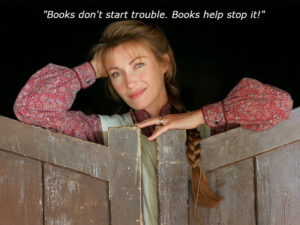A new edition of Mark Twain’s Adventures of Huckleberry Finn hopped aboard the political correctness train, to some recent uproar and mixed opinions. As a writer, I have a strong opinion on censorship and banned books. And as a general supporter of knowledge itself, I take offense to actions that try to eliminate our literary record of history.
Latest Censorship Victim
Literary censorship has been part of American society for decades. What’s caused the debate this time is a “simple” switch of the words nigger and Injun to slave and Indian. The hope is to remove Twain’s classic from the Banned Books shelf.
Look, I’m game for more access to a treasured story. But at what cost?
The New York Times article opens: “What’s the harm? Does one word alter the whole story?” The answer to that is a Big. Fat. YES! It does! Some people deny this. They believe the switch is a good thing, because, politically, it cancels out any negative connotations the words carry.
Really?!
Let’s give this more thought: how do “slave” or “Indian” hurt less when used in a derogatory sense? I mean, I could make spaghetti snotface sound derogatory in the right context. And that’s the trick right there, isn’t it? Context, perspectives, and interpretations shape everything.
 Word Choice Matters
Word Choice Matters
In every creative writing class I’ve ever taken, one lesson remains constant: word choice is crucial, and therefore must be considered wisely. A writer’s diction drives the impact her piece has on readers, especially in light of varying perspectives.
Take some examples:
Katie ran down the street, away from her pursuer, Chuck.
The language used in the example above leaves the sentence open to interpretation. Readers will conjure their own ideas on exactly how Katie runs. But if I wish to convey a specific type of running, I’ll choose words that fit.
Katie rushed down the street, away from her pursuer, Chuck.
In this second example, the image that comes to mind might be more negative. Panic. Fear. Katie doesn’t want Chuck chasing her, so she’s hurrying away. Readers can then imagine a frown on her face. Wide eyes, perhaps with some tears.
Katie skipped down the street, away from her pursuer, Chuck.
With Katie now skipping, readers are more inclined to picture a smile on her face. She might even be laughing because the guy she likes is chasing her as part of a game.
Language Changes Everything
Mark Twain himself said that “the difference between the right and wrong word is the difference between lightning and a lightning bug.” This is a beautiful image. Lightning is a bright, obnoxious, and often scary thing for people. But a lightning bug? The small insect poses little threat.
The point is, Twain knew what he was doing. He chose words to express certain ideas. “Nigger” and “Injun” were part of the vernacular in Huck Finn’s time. Huck didn’t see any offense in them; he spoke how he was taught. Changing that alters the story because it removes the tone Twain meant for his story to have, as well as the historical accuracy of the piece.
Literature As History
Racism happened. It sucks, it’s wretched, and it forever dominates how people interact with one another. Unless we educate ourselves. Use literature as a device from which to teach and learn about societies, cultures, and history.
Some folks feel we must “protect” ourselves and our children from certain values or beliefs, as if sheltering the young somehow means the world’s negativity doesn’t exist. For that reason, censorship is seen as “righteous.”
Lessons From Pop Culture
To that, I say we take the words of beloved 90’s doctor, Michaela Quinn. In one episode, the town discovers the “evil horrors” with the pages of their new library’s collection. Books about selling one’s soul to the devil (Faust) or an unwed mother (The Scarlet Letter) cause an uproar in the community. Until Dr. Mike shares a book with the Reverend wholly agrees must be banned. It tells of human sacrifice, polygamy, bets with the Devil himself.
The townsfolk ask Dr. Mike which book hosts so much evil. She turns to them and says, “The Holy Bible.”
Pingback: Language: A Two-Faced Coin - zaelyna.com